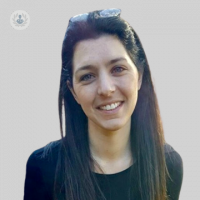What is compassion-focused therapy (CFT)?
Written in association with:Compassion-focused therapy (CFT) is a widely-acclaimed therapeutic approach gaining recognition for its effectiveness in addressing a wide variety of mental health concerns.
Here, Dr Charlotte Whiteley, renowned chartered psychologist, offers an expert insight into the fundamentals of CFT, exploring its benefits, techniques, and compatibility with other therapies.

What is compassion-focused therapy (CFT)?
Compassion-focused therapy (CFT) is a form of psychotherapy that integrates elements from cognitive behavioural therapy (CBT), evolutionary psychology, neuroscience, and Buddhist philosophy to help patients develop self-compassion and extend compassion to others.
Unlike traditional therapeutic approaches that may focus solely on changing thoughts and behaviours, CFT emphasises nurturing a compassionate mindset to alleviate self-criticism, shame, and other negative emotions. At its core, CFT acknowledges the importance of compassion in promoting emotional wellbeing and resilience.
Who can benefit from compassion-focused therapy (CFT)?
CFT is suitable for patients grappling with a range of psychological difficulties, including:
- Low self-esteem: CFT helps patients struggling with low self-esteem learn to treat themselves with kindness and acceptance.
- Self-criticism and shame: For patients burdened by self-criticism and shame, CFT offers tools to challenge negative self-talk and cultivate self-compassion.
- Depression and anxiety: CFT provides strategies to manage symptoms of depression and anxiety by fostering emotional regulation skills and resilience.
- Trauma and post-traumatic stress disorder (PTSD): CFT can complement trauma-focused therapies by addressing feelings of shame and self-blame often associated with traumatic experiences.
- Relationship problems: Patients experiencing challenges in their relationships can benefit from learning compassionate communication and empathy skills.
What are some common techniques used in compassion-focused therapy (CFT)?
CFT employs a variety of techniques aimed at nurturing compassion and fostering emotional wellbeing. Common techniques include:
- Compassionate imagery: Guided visualisation exercises help patients evoke feelings of compassion and warmth toward themselves and others.
- Compassionate self-talk: CFT teaches patients to replace self-critical thoughts with kind and supportive self-talk, promoting a more compassionate inner dialogue.
- Mindfulness practices: Mindfulness techniques are used to cultivate present-moment awareness and develop a non-judgmental attitude towards one's experiences.
- Letter writing: Letter writing exercises allow patients to express gratitude, forgiveness, or apologies, promoting emotional healing and connection.
Can compassion-focused therapy (CFT) be combined with other therapeutic modalities?
CFT can be integrated with other therapeutic modalities to create a more comprehensive treatment approach tailored to the patient's specific needs. CFT may be combined with:
- Cognitive behavioural therapy (CBT): Integrating CFT with CBT techniques can enhance the effectiveness of therapy by addressing cognitive distortions and behavioural patterns while fostering self-compassion.
- Mindfulness-based therapies: Combining CFT with mindfulness-based approaches such as mindfulness-based cognitive therapy (MBCT) or acceptance and commitment therapy (ACT) can deepen the cultivation of compassion and mindfulness skills.
- Dialectical behaviour therapy (DBT): CFT can complement the emotion regulation and interpersonal effectiveness skills taught in DBT, particularly for patients with borderline personality disorder or emotion dysregulation.
How long does compassion-focused therapy (CFT) typically last?
The duration of CFT varies depending on the patient's specific needs, goals, and the severity of their presenting issues. Some patients may benefit from short-term interventions focused on learning specific skills, while others may engage in longer-term therapy to address deeper emotional wounds and ingrained patterns of self-criticism.
Typically, CFT sessions are conducted weekly or biweekly, with therapy lasting anywhere from a few months to a year or more, depending on the patient's progress and therapeutic goals.
If you would like to schedule an appointment with Dr Charlotte Whiteley, head on over to her Top Doctors profile today.


